| March 15
Thanks for your interest. I'd be happy to see my
boat in Duckworks. It's what I call a "Stickleback
on Steroids." I built and have much enjoyed rowing
- and sailing with a 45 sq.ft. spritsail on a windsurfer
mast - the 16-foot Ian Oughtred classic, so I decided
to redraw it as a pocket cruiser. To that end I stretched
it 40%, to 22 feet on deck and broadened it by 60%,
giving it more beef, and, presumably, more stability
- beyond that which comes from simply making it bigger
- than the original.
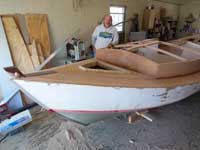 |
The side decks
are built up from 3/4-inch square fir to a width
of about 9 inches. I worked to keep the cabin
light with minimal framing, 3/8-inch okume sides
and 1/4-inch fir top - I do not intend to dance
any hornpipes thereupon!. |
| The centerboard
holds about 50 pounds of steel to sink it. As
for the rig, my present tanbark Stickleback main
will be the mizzen. |
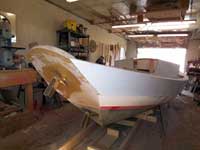
|
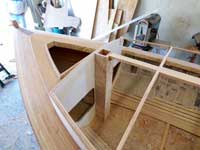 |
The main will
be a custom tanbark balanced lug on a Doug fir
mast. Total area will be about 200 sq feet.
Total weight, unballasted, should be about 600
pounds. |
| As for construction,
rather than try to scarph up and spile those long
planks in advance, I ran longitudinal stringers
from stem to stern over the three bulkheads and
installed each section of strake (three to a length,
three strakes to a side, for a total of 18 plank/sections)
individually, joining with butt blocks. |
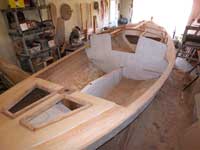
|
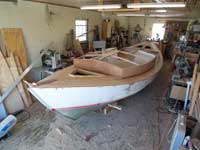 |
The bottom is
3/4-inch marine Doug fir, scarphed end to end.
The rest of the planking is 3/8-inch marine
Doug fir. I found that to get the rather extreme
bend in the forward three feet of the garboards,
some kerfing was required; I reinforced the
result with two layers of glass and epoxy inside
and out. The rest of the hull is glassed with
one layer and the bottom and garboards are further
coated in epoxy and graphite.
|
| The cabin has full
sitting headroom and I will either sleep on the
floorboards (six feet long) or mount a bunk athwartships
just inside the companionway, at the level where
there's six feet of beam. |
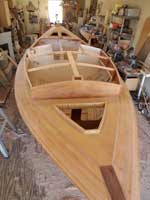
|
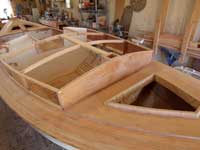 |
Decks (other
than the side decks), coachroof top and hatch
tops are covered with unbleached muslin in epoxy,
which, when painted, should look like pretty
convincing canvas. |
I have about 400
pounds of steel plate pieces that will go under
the cabin floorboards to the extent needed. Not
being versed in differential calculus, I'm not
sure what final draft and ballasted weights will
be; we'll see.
|
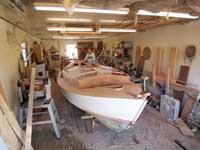
|
As soon as I locate and modify the appropriate trailer
I plan to take the boat to a local reservoir for some
hydrostatic testing and rowing drills (with 9-foot
fiberglass rowing shell oars).
June 13
I live in Williamsburg, Virginia, about halfway between
Richmond and Norfolk, on the Virginia Peninsula, between
the York (of Yorktown fame, to the north) and the
James (of Jamestown fame, to the south) Rivers. I
sail on the York, a tidal brackish river, as far down
as the area where it empties into and becomes the
southern Chesapeake Bay.
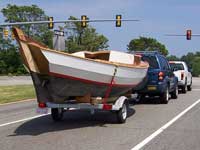 |
I have more
pictures, including these of the test launch. |
| She is commissioned
and sailing on the lower York River and the lower
Chesapeake. |
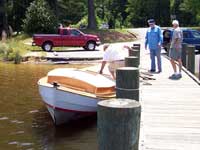
|
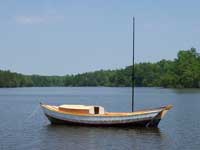 |
After two years
of off-again, on-again work, I'm looking forward
to using her (tentatively named Valkyrie). |
Our sailing season sort of runs from April through
November, but there are occasional sailable days even
in the winter, although most of us, myself included,
aren't in the right mindset to launch and rig in January
and February. High summer is often oppresively hot
and still, with impressive afternoon thunderstorms.
I once had the harrowing experience of taking part
of a lightning stroke - whether it was a near miss
or hit my sharpie mast and spread from there - through
the ring finger of my left hand.
Regards,
Bob Austin
(designer and builder of windsurfer-rigged cat-ketch
sharpie Orion, which appeared earlier
in Duckworks.)

|